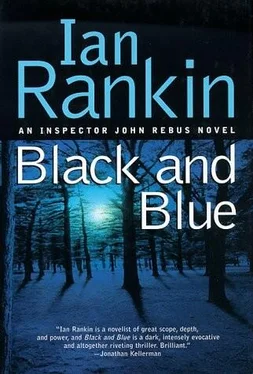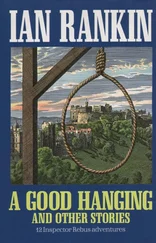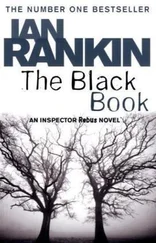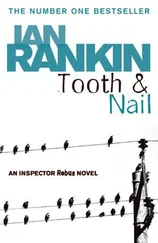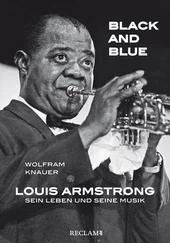‘You’ve always written a good, clear report, Brian.’
‘What do you mean?’
‘If the words aren’t coming out right, try writing them down.’
‘Send her a letter?’
‘Call it that if you like. Just put down what it is you want to say, maybe try explaining why you feel that way.’
‘Have you been reading Cosmopolitan or something?’
‘Only the problem page.’
They had a laugh at that, though it didn’t really merit one. Brian stretched in his chair. ‘I need a sleep,’ he said.
‘Get an early night, write the letter first thing tomorrow.’
‘Maybe I will, aye.’
Rebus started to get to his feet. Brian watched him rise.
‘Don’t you want to hear about Mick Hine?’
‘Who he?’
‘Ex-con, the last man to speak to Lenny Spaven.’
Rebus sat down again.
‘I had a job tracking him down. Turns out he was here in town all the time, sleeping rough.’
‘And?’
‘And I had a word with him.’ Brian paused. ‘And I think you should, too. You’ll get a very different picture of Lenny Spaven, believe me.’
Rebus believed him, whatever he meant. He didn’t want to, but he did.
Jack was utterly opposed to the idea.
‘Look, John, my boss is going to want to talk to this guy Hine, right?’
‘Right.’
‘How’s it going to look when he finds out not just that your pal Brian’s been there first, but that you’ve followed up?’
‘It’s going to look bad, but he hasn’t told me not to.’
Jack growled his frustration. They’d dropped his car back at the flat, and were now walking down on to Melville Drive. One side of the road was Bruntsfield Links, the other the Meadows, a flat grassy stretch which could be wonderful on a hot summer’s afternoon — a place to relax, to play football or cricket — but scary at night. The paths were lamp-lit, but it was like the wattage had been turned down. Some nights, the walk was positively Victorian. But this was summer, the sky still pink. There were squares of light shining from the Royal Infirmary and a couple of the tall university buildings huddled around George Square. Female students crossed the Meadows in packs, a lesson learned from the animal world. Maybe there were no predators out there tonight, but the fear was just as real. The government had pledged to combat ‘the fear of crime’. It was reported on the TV news just before the latest Hollywood shoot-’em-up.
Rebus turned to Jack. ‘You going to grass me up?’
‘I should.’
‘Yes, you should. But will you?’
‘I don’t know, John.’
‘Well, don’t let our friendship stand in your way.’
‘That helps me a lot.’
‘Look, Jack, the water I’m in is so deep, I’d probably die of the bends coming back up. So I might just as well stay down here.’
‘Ever heard of the Marianas Trench? Ancram probably has one just like it waiting for you.’
‘You’re slipping.’
‘What?’
‘He was Chick before, now he’s “Ancram”. You better watch yourself.’
‘You’re sober, aren’t you?’
‘As a judge.’
‘Can’t be Dutch courage then, which means it’s plain insanity.’
‘Welcome to my world, Jack.’
They were headed for the back of the Infirmary. There were benches provided just this side of the perimeter wall. Dossers, travellers, down-and-outs... whatever you wanted to call them... they used these benches as beds in the summer. There used to be one old guy, Frank, Rebus saw him every summer, and at the end of every summer he disappeared like a migrating bird, only to reappear the next year. But this year... this year Frank hadn’t appeared. The homeless people Rebus saw were a lot younger than Frank, his spiritual children, if not grandchildren; only they were different — tougher and more frightened, wired and tired. Different game, different rules. Edinburgh’s ‘gentlemen of the road’: twenty years ago you could have measured them in mere dozens. But not these days. Not these days...
They woke up a couple of sleepers, who denied being Mick Hine and said they didn’t know who he was, and then hit lucky with the third bench. He was sitting upright, a pile of newspapers beside him. He had a tiny transistor radio, which he held hard to his ear.
‘Are you deaf or does it just need new batteries?’ Rebus asked.
‘Not deaf, not dumb, not blind. He said another copper might want to talk to me. Do you want a seat?’
Rebus sat down on the bench. Jack Morton rested against the wall behind it, like he’d rather be somewhere out of earshot. Rebus drew out a fiver.
‘Here, get some batteries.’
Mick Hine took the money. ‘So you’re Rebus?’ He gave Rebus a long look. Hine was early forties, balding, with a slight squint. He wore a decent enough suit, only it had holes in both knees. Beneath the jacket was a baggy red T-shirt. Two supermarket carrier bags sat on the ground beside him, bulging with worldly goods. ‘Lenny talked about you. I thought you’d be different.’
‘Different?’
‘Younger.’
‘I was younger when Lenny knew me.’
‘Aye, that’s true. Only film stars get younger, have you noticed that? The rest of us get wrinkled and grey.’ Not that Hine was either. His face was lightly tanned, like polished brass, and what hair he had was jet black and worn long. He had grazes on his cheeks and chin, forehead, knuckles. Either a stumble or a beating.
‘Did you fall over, Mick?’
‘I get dizzy sometimes.’
‘What does the doctor say?’
‘Eh?’
No doctor consulted. ‘You know there are hostels, you don’t need to be out here.’
‘Full up. I hate queueing, so I’m always at the back. Your concern has been noted by Michael Edward Hine. Now, do you want to hear the story?’
‘In your own time.’
‘I knew Lenny in prison, we shared a cell for maybe four months. He was the quiet type, thoughtful. I know he’d been in trouble before, and yet he didn’t fit with prison life. He taught me how to do crosswords, sort out all the jumbled letters. He was patient with me.’ Hine seemed to be drifting off, but pulled himself back. ‘The man he wrote about is the man he was. He told me himself, he’d done wickedness and never been punished for it. But that didn’t make it any easier on his soul, being punished for a crime he didn’t commit. Time and again he told me, “I didn’t do it, Mick, I swear to God and anybody else who’s up there.” It was an obsession with him. I think if he hadn’t had his writing, he might have done away with himself sooner.’
‘You don’t think he was got at?’
Hine thought it over before shaking his head firmly. ‘I believe he took his own life. That last day, it was like he’d come to a decision, made peace with himself. He was calmer, almost serene. But his eyes... he wouldn’t look at me. It was like he couldn’t deal with people any more. He talked, but he was conversing with himself. I liked him such a lot. And his writing was beautiful...’
‘The last day?’ Rebus prompted. Jack was peering through the railings at the hospital.
‘The last day,’ Hine repeated. ‘That last day was the most spiritual of my life. I really felt touched by... grace.’
‘Lovely girl,’ Jack muttered. Hine didn’t hear him.
‘You know what his last words were?’ Hine closed his eyes, remembering. ‘ “God knows I’m innocent, Mick, but I’m so tired of saying it over and over.”’
Rebus was fidgeting. He wanted to be flippant, ironic, his usual self — but now he found he could identify all too easily with Spaven’s epitaph; even perhaps — just a little — with the man himself. Had Lawson Geddes really blinded him? Rebus hardly knew Spaven at all, yet had helped put him in jail for murder, breaching rules and regulations in the process, aiding a man who was feverish with hatred, spellbound by revenge.
Читать дальше
